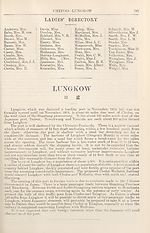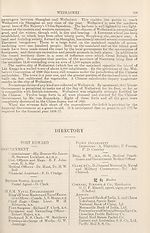1917
(862) [Page 768] - Weihaiwei
Download files
Complete book:
Individual page:
Thumbnail gallery: Grid view | List view
![(862) [Page 768] - Weihaiwei](https://deriv.nls.uk/dcn17/1945/4351/194543516.17.jpg)
WEIHA1WEI
M M Weihaiwei
Weihaiwei is situated on the south side of the Gulf of Pechili near the extremity
of the Shantung Promontory, and about 115 miles distant from Port Arthur on the-
north-west and the same from the port of Kiaochau on the south-west.
Formerly a strongly fortified Chinese naval station, it was captured by the Japanese |
on 30th January, 1895, and was held by them pending the payment of the indemnity, which '
was finally liquidated in 1898. Before the evacuation by the Japanese an agreement j
was arrived at between Great Britain and China that the former should take over the j
territory on lease from the latter, and accordingly, on the 24th May, 1898, the British |
flag was formally hoisted, the Commissioners representing their respective countries-1
at the ceremony being Consul Hopkins, of Chefoo, and Captain King-Hall, of H.M.S. |
Narcissus, for Great Britain, and Taotai Yen and Captain Lin, of the Chinese war
vessel Foochi, for China. Weihaiwei was leased to Great Britain “for so long a period |
as Port Arthur shall remain in the occupation of Russia,” but though Port Arthur was- j
surrendered to the Japanese on January 1st, 1905, Great Britain has not announced any |
intention to withdraw from Weihaiwei, which the Government regards as a sanatorium j
for the British squadron on the China station. |
The leased territory, which lies in latitude 37 deg. 30min.N, longitude 122 deg.lOmin.E, 1
comprises the Island of Lin Kung, all the Islands in the Bay of Weihaiwei, and a belt of J
land ten English miles wide along the entire coastline, and consists of ranges of rugged' a
mountains and rocky hills up to 1,500 feet high, dividing the plains into valleys 1
and river beds. The island of Lin Kung, once barren and nearly treeless, but now 1
verdant and picturesque as the result of a system of afforestation inaugurated in 1910,1
is formed by a backbone of hills rising to some 500 feet. The hillsides on the main- |
land, of which Port Edward is the chief port, are either barren rock or planted with |
dwarf pine and scrub oak trees. The valleys are mostly undulating country full of |
gullies and mountain river beds; the streams are all torrential, and choke up the valleys- J
with sand and debris from the hills. During three-quarters of the year these river beds |
are dry. All the hills are terraced for cultivation as far as possible. The total area of j
the leased territory is about 285 square miles. _ 1
The strata of the mountains are metamorphic, consisting of beds of quartzite, gneiss j
crystalline, and limestone, cut across by dykes of volcanic rock and granite. Gold is 4
found in the territory, and has been worked by the Chinese, and silver, tin, lead, and -
iron are said to exist. Good building-stone and a rich non-hydraulic limestone are
found. The territory contains some 330 villages, and the population is estimated I
to be 150,000. There are four small market towns, where fairs are held every five days, n
The Chinese inhabitants are either fishermen or farmers, and are a peaceful, law- J
abiding folk. The chief export trade is in salt fish, which is carried in Chinese junks-1
to Southern China. Of late years a large export trade in pea-nuts has also grown up.
The import trade chiefly consists of timber, firewood, and maize from Manchuria, paper, ;
crockery, sugar, and tobacco, kerosene oil, cotton yarn, piece goods, liquid indigo and i
other dyes.
The Government of Weihaiwei is administered by a Commissioner appointed
under the Weihaiwei Order-in-Council of the 24th July, 1901. Under this Orderi
the Commissioner is empowered to make Ordinances for the administration of the-1
territory. There is a High Court established, in which all jurisdiction, civil and criminal, u
is vested, subject to an appeal to the Supreme Court in the Colony of Hongkong, j
District Magistrates’Courts are also provided for. The Commissioner resides on the- ,]
mainland at Port Edward. The village communities are administered through their
headmen in accordance with Chinese laws and usages, and the people have now entirely
acquiesced in the newly-established regime. All purely civil matters are left as much ;
as possible to the village headmen. There is, perhaps, no place in China occupied by r
foreigners where labour is so cheap. Weihaiwei is now a fairly regular port of call
for many China coasting steamers sailing northwards from Shanghai, and there is a
regular weekly service subsidised by Government to run all the year carrying mails and ,
M M Weihaiwei
Weihaiwei is situated on the south side of the Gulf of Pechili near the extremity
of the Shantung Promontory, and about 115 miles distant from Port Arthur on the-
north-west and the same from the port of Kiaochau on the south-west.
Formerly a strongly fortified Chinese naval station, it was captured by the Japanese |
on 30th January, 1895, and was held by them pending the payment of the indemnity, which '
was finally liquidated in 1898. Before the evacuation by the Japanese an agreement j
was arrived at between Great Britain and China that the former should take over the j
territory on lease from the latter, and accordingly, on the 24th May, 1898, the British |
flag was formally hoisted, the Commissioners representing their respective countries-1
at the ceremony being Consul Hopkins, of Chefoo, and Captain King-Hall, of H.M.S. |
Narcissus, for Great Britain, and Taotai Yen and Captain Lin, of the Chinese war
vessel Foochi, for China. Weihaiwei was leased to Great Britain “for so long a period |
as Port Arthur shall remain in the occupation of Russia,” but though Port Arthur was- j
surrendered to the Japanese on January 1st, 1905, Great Britain has not announced any |
intention to withdraw from Weihaiwei, which the Government regards as a sanatorium j
for the British squadron on the China station. |
The leased territory, which lies in latitude 37 deg. 30min.N, longitude 122 deg.lOmin.E, 1
comprises the Island of Lin Kung, all the Islands in the Bay of Weihaiwei, and a belt of J
land ten English miles wide along the entire coastline, and consists of ranges of rugged' a
mountains and rocky hills up to 1,500 feet high, dividing the plains into valleys 1
and river beds. The island of Lin Kung, once barren and nearly treeless, but now 1
verdant and picturesque as the result of a system of afforestation inaugurated in 1910,1
is formed by a backbone of hills rising to some 500 feet. The hillsides on the main- |
land, of which Port Edward is the chief port, are either barren rock or planted with |
dwarf pine and scrub oak trees. The valleys are mostly undulating country full of |
gullies and mountain river beds; the streams are all torrential, and choke up the valleys- J
with sand and debris from the hills. During three-quarters of the year these river beds |
are dry. All the hills are terraced for cultivation as far as possible. The total area of j
the leased territory is about 285 square miles. _ 1
The strata of the mountains are metamorphic, consisting of beds of quartzite, gneiss j
crystalline, and limestone, cut across by dykes of volcanic rock and granite. Gold is 4
found in the territory, and has been worked by the Chinese, and silver, tin, lead, and -
iron are said to exist. Good building-stone and a rich non-hydraulic limestone are
found. The territory contains some 330 villages, and the population is estimated I
to be 150,000. There are four small market towns, where fairs are held every five days, n
The Chinese inhabitants are either fishermen or farmers, and are a peaceful, law- J
abiding folk. The chief export trade is in salt fish, which is carried in Chinese junks-1
to Southern China. Of late years a large export trade in pea-nuts has also grown up.
The import trade chiefly consists of timber, firewood, and maize from Manchuria, paper, ;
crockery, sugar, and tobacco, kerosene oil, cotton yarn, piece goods, liquid indigo and i
other dyes.
The Government of Weihaiwei is administered by a Commissioner appointed
under the Weihaiwei Order-in-Council of the 24th July, 1901. Under this Orderi
the Commissioner is empowered to make Ordinances for the administration of the-1
territory. There is a High Court established, in which all jurisdiction, civil and criminal, u
is vested, subject to an appeal to the Supreme Court in the Colony of Hongkong, j
District Magistrates’Courts are also provided for. The Commissioner resides on the- ,]
mainland at Port Edward. The village communities are administered through their
headmen in accordance with Chinese laws and usages, and the people have now entirely
acquiesced in the newly-established regime. All purely civil matters are left as much ;
as possible to the village headmen. There is, perhaps, no place in China occupied by r
foreigners where labour is so cheap. Weihaiwei is now a fairly regular port of call
for many China coasting steamers sailing northwards from Shanghai, and there is a
regular weekly service subsidised by Government to run all the year carrying mails and ,
Set display mode to:
![]() Universal Viewer |
Universal Viewer | ![]() Mirador |
Large image | Transcription
Mirador |
Large image | Transcription
Images and transcriptions on this page, including medium image downloads, may be used under the Creative Commons Attribution 4.0 International Licence unless otherwise stated. ![]()
| Asian directories and chronicles > 1917 > (862) [Page 768] - Weihaiwei |
|---|
| Permanent URL | https://digital.nls.uk/194543514 |
|---|
| Attribution and copyright: |
|
|---|---|
| Description | Volumes from the Asian 'Directory and Chronicle' series covering 1917-1941, but missing 1919 and 1923. Compiled annually from a multiplicity of local sources and research. They provide listings of each country's active corporations, foreign residents and government agencies of all nationalities for that year, together with their addresses. Content includes: various treaties; coverage of conflicts; currencies and taxes; consular fees; weights and measures; public holidays; festivals and traditions. A source of information for both Western states and communities of foreigners living in Asia. Published by Hongkong Daily Press. |
|---|---|
| Shelfmark | H3.86.1303 |
| Additional NLS resources: |

